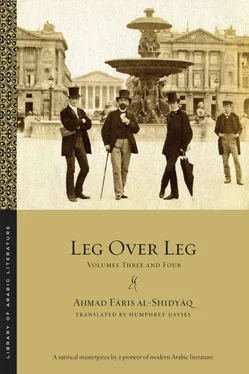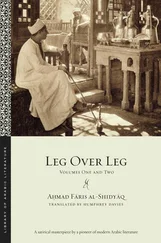Another kind of lover is the one who loves a woman more if she is proud, a spitfire, difficult to handle, so that conciliating her calls for energy and effort. Most of those who undertake such a task have no other occupation than love and divert themselves with it wherever they find it. Another is the man who loves a woman who possesses the traits of nobility, self-command, and dignity; this is the way of men of ambition and capacity. Any man who sees a woman of humble station who resembles one nobly born and falls in love with her simply because of the resemblance belongs to this category, and the members of this school are called “comparators.” It is more common among women, for a woman can scarcely see a man without saying, “he looks like one of the emirs of the olden days,” or today’s days, or the coming days. Another is the man who falls in love with the woman who is abject, meek, and affectionate; this is the way of those who are kind and sensitive. Another is the man who falls in love with the woman whose countenance bears signs of grief, depression, and worry; this is the way of the tenderhearted and those easily moved by music. Another is the man who falls in love with the woman who is full of joy, unrestrained, and fun-loving; this is the disposition of those who are sad and wretched, for to look at a woman of that type dispels care and brings light where once reigned distress and despair . Another is the man who falls in love with the woman who is full of mirth and frivolity, flightiness, chatter, and hilarity; this is the way of fools and the ignorant. Another is the man who falls in love with a woman for her culture, understanding, eloquence, readiness of tongue, and quickness of wit; this is the course of scholars and litterateurs. Another is the man who falls in love with women who have lots of trinkets and dress elegantly, who are full of coquetry and affectation; this is the road of those given to extravagance and excess. Another is the man who falls in love with the wanton, shameless, brazen woman; this is the case with depraved lechers. Another is the man who falls in love with the inconstant, sensual, nymphomaniacal, unclean woman; this is the disposition of the man to whom whoring has done its worst. Another is the man who falls in love with the chaste virgin who refuses to let any man have his way with her, in the hope of corrupting her and then boasting of it among his peers; if, subsequently, she gives in to him, he grows tired of her or wishes she hadn’t. Such men, in my opinion, are more evil than those who make love to nymphomaniacs. And another is the man who loves the coming together of all these different traits in his beloved, as appropriate. So much for the moral dimension. As for the physical, the thin man falls for the fat woman and vice versa, the brown-skinned loves the white and vice versa, the tall loves the short and vice versa, and the smooth-skinned loves the hirsute and vice versa. As far as women are concerned, the man they love most is the bull-necked horseman, dashing and daring.
3.2.23
Riches and poverty have no bearing on the matter. A rich man is as likely to become infatuated with a poor woman as he is with a rich one. Indeed, a rich miser prefers to fall in love with a poor woman because he believes he can make her happy with only a little money. Also, as a rule, people prefer to fall in love with members of strange races so as to find out about the exotic things they imagine are peculiar to them, unless an ignorance of their language makes this impossible; when this is the case, the scope for the imagination is cramped. It is also true that men like women’s gentleness and sprightliness, especially in bed, while women like men for their young sappiness and tall, youthful strappiness. No woman can look at a man of such a description and not say in her heart, “There’s everything I need! There are riches enough for me!” The ancient Arabs recognized this fact when they derived ṭawl (“might”) from ṭūl (“height”). At the same time, however, women, for the most part, glean their pleasure from every crop and sip from its sources both sweet and sour. Such women are like the bee that gathers its nectar from the flower though the latter is on a dung heap. As to jealousy, it is an inborn trait natural to every human, providing he has good taste: a man is jealous of his material possessions being violated by another; how much more so will he be then in the case of his supposedly inviolable wife? The claim that the Franks feel no jealousy with regard to their women has no truth to it whatsoever. A Frank has been known to kill his wife and himself together on learning that she has been unfaithful. True, they give them so much free rein in many matters that Orientals might regard them as pimping them, but this contains at the same time its own protection against betrayal, for it is a given among them that should a man forbid his wife to leave the house or keep company with other men, he will prod her into taking a second lover, which he would not if he were to consent to her indulging in such pleasures outside the home.
3.2.24
When it came out that the two honey-seekers 25(the Fāriyāq and the girl) were meeting in contravention of accepted custom, her mother felt the serpent’s tooth of filial ingratitude and consulted some of her friends on the matter. These told her, “We cannot agree to such a marriage because he is a Bag-man, while you belong to the most august house among the Market-men, and never the twain shall meet.” She responded, “He isn’t of Bag-man stock, but rather an interloper among them.” “It makes no difference,” they said, “for the stench of the bag is upon him and fills our nostrils,” and they gave her dire warnings against him, even though in the preceding chapter I had issued warnings to them and their like against such meddling. When the girl learned what they had said, the spirit of rebellion rose within her and she declared, “Such differences are no concern of women. They are the concern of those who would use them as a path to a career and high status. The goal of marriage is the mutual satisfaction and agreement of a man and a woman. If you refuse this marriage, I warn you I shall have nothing more to do with Market-men.” At this, her mother thought it best to take her away from that place in the hope that distance would make her forget. All the tempests of love then arose in both honey-gatherer and honey-giver, in keeping with the words of Abū Nuwās, “Reproach me not, for reproach is a spur.” 26When the mother saw that no amount of haranguing would keep the girl from the hive, no hatchet work hinder her extracting honey,(1) she went back to her house, summoned the Fāriyāq, and said to him, “I have discovered that the Market-men are opposed to having you as an in-law, so if your mind’s set on marrying my daughter, you must become a Market-man, if only for a day.” “That’s fine,” said the Fāriyāq, and with that understanding he became a Market-man for the day of his wedding, and both she and the girl were happy.
3.2.25
At night, the instruments were brought, the cups sent around, and a good time was had by all, the Fāriyāq applying himself so devotedly to ensuring the regular passage of the cup and to praising the players with repeated calls of “Ah!” and “Ay!” and “Ooh!” that both his hand and tongue tired and, seeing that the company was determined to spend the entire night till morning drinking, he stole out and climbed to the roof to take a rest, it being a moonlit summer night. When he was slow to return, the others thought he must have slipped the knot, so they began searching for him as one searches for a woman with large breasts , or one who so hates her husband she’d curse him with her last breaths . When they found him, and realized that he had different things in mind than they did, they left him and his bride alone in a room and made to depart — but “No!” said the mother. “Will you not wait to see the bloody proof(1) with your own eyes?” The reason for this is that it is the general custom among Egyptians for a man to marry a woman without first keeping her company or finding out about her character; he just gives her a single look as she hands him a cup of coffee or a glass of sherbet in the presence of her mother. If she pleases him, he asks for her hand from her relatives; if not, he stops visiting them. Some of them marry without having ever seen their wives. This happens when a man sends his mother, or an elderly female relative or acquaintance, or a priest to her and these describe her to him according to their own taste and experience. Usually the girl’s mother bribes the priest to give a good description of her daughter and so make the man want to marry her. Some will marry a woman who resides in some distant town, writing to one of his acquaintances in that area to ask him to send him a description in a letter, after which he asks God for guidance and inserts his head into the noose. Despite this, such couples live happy lives. In the Levant, the city people do as the Egyptians, but the people of the Mountain have a different custom. There the man can see the woman and find out about her character. This being the case, and because the Fāriyāq had contravened the custom of Egypt by meeting with the girl on numerous occasions both in the presence and absence of her mother, the mother wanted to distance her from any shame by displaying the sign of her virginity, so that report of her daughter’s innocence might be broadcast throughout the land.
Читать дальше












